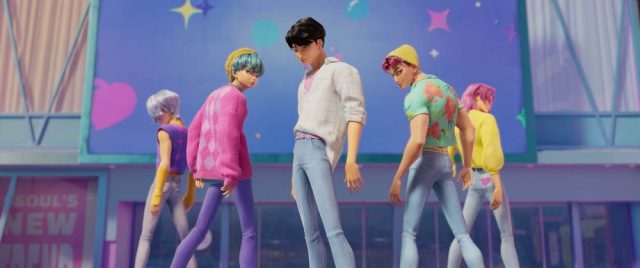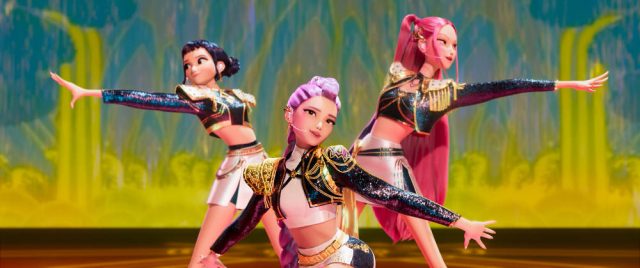The stars and creators open up about K-drama influences, battling shame, and creating a movie for every age
When they aren’t selling out stadiums, Rumi, Mira, and Zoey have another job: slaying demons.
In K-Pop Demon Hunters, now streaming on Netflix, a trio of K-pop idols use their secret identities to protect their fans from supernatural threats. But behind the magical fight scenes and music-driven mayhem lies a much deeper message about identity, shame, and self-acceptance.
Gayety reporter Calix Quan caught up with stars Arden Cho, May Hong, and Ji-young Yoo, as well as directors Maggie Kang and Chris Appelhans, to talk about the film’s emotional themes, cultural inspirations, and why it hits especially hard for viewers who’ve ever felt the need to hide who they are.
“It has everything we love,” said Arden Cho, who voices Rumi. “It’s like this magical world and it’s girls kicking ass, let’s go.”
Fighting Demons—Literal and Metaphorical

But beyond the fantasy, K-Pop Demon Hunters delivers an emotional gut punch. The film explores shame with surprising depth—an experience many LGBTQ+ viewers will find relatable.
“I feel like… everybody has their own types of demons or things that they’re battling, their insecurities and things they’re scared of,” Cho explained. “For Rumi, she’s going through this identity crisis, but also trying to do it all. And I would say for anyone who’s struggling with it, my advice is, one: I think having community is really important. Your sisters, your friends… without Mira and Zoey, she wouldn’t have made it.”
Director Maggie Kang confirmed that was always the intention.
“We used to always compare it—Rumi’s story—as like she’s coming out of the closet and coming clean to her parents who is wanting her to be something that she’s not,” Kang said. “So yeah, it was just kind of naturally part of the kind of crafting of it and the storytelling.”
That authenticity extended to the film’s look and sound. The directors pulled visual cues from K-dramas, used real K-pop choreo as references, and built mood boards filled with “hundreds of gifs” to guide animators.
“The badass lead of a K-drama, perfect dude who slightly feels some feelings for the first time, his eyelids do a little fluttery thing,” Appelhans said. “And we have just 40 gifs of that that we give to our animators.”
“The best part… was the animators were fans of K-dramas. Many of them were Korean and they’re like, I finally get to animate this thing that I love and do my take on it in animation,” he added.
A Message of Self-Love for Every Generation

For Ji-young Yoo, who voices Zoey, the emotional arc of the film is what hits hardest.
“So much of this is—the demons in a lot of ways are really a metaphor for the critics both in the world around you and the ones in your head,” she said. “I think the women in the film are powerful because they embrace who they are and they’re proud of who they are. I think that’s the journey of really all three women in different ways… I hope that kids take away that message and that also, it’s just a really fun movie.”
May Hong, who plays Mira, summed it up perfectly:
“Now we get to give it to ourselves basically too. Just like being part of it is so surreal.”
“Even though we’re grown up, we could still be kids and we can enjoy it,” added Cho. “And I feel like that’s what I also hope people take away from this… people think an animated film is just for kids, but it’s not.”
With stunning animation, original songs by K-pop artists like TWICE’s Jeongyeon, Jihyo, and Chaeyoung, and a powerful message about being your truest self, K-Pop Demon Hunters is more than a movie—it’s a cultural milestone.



